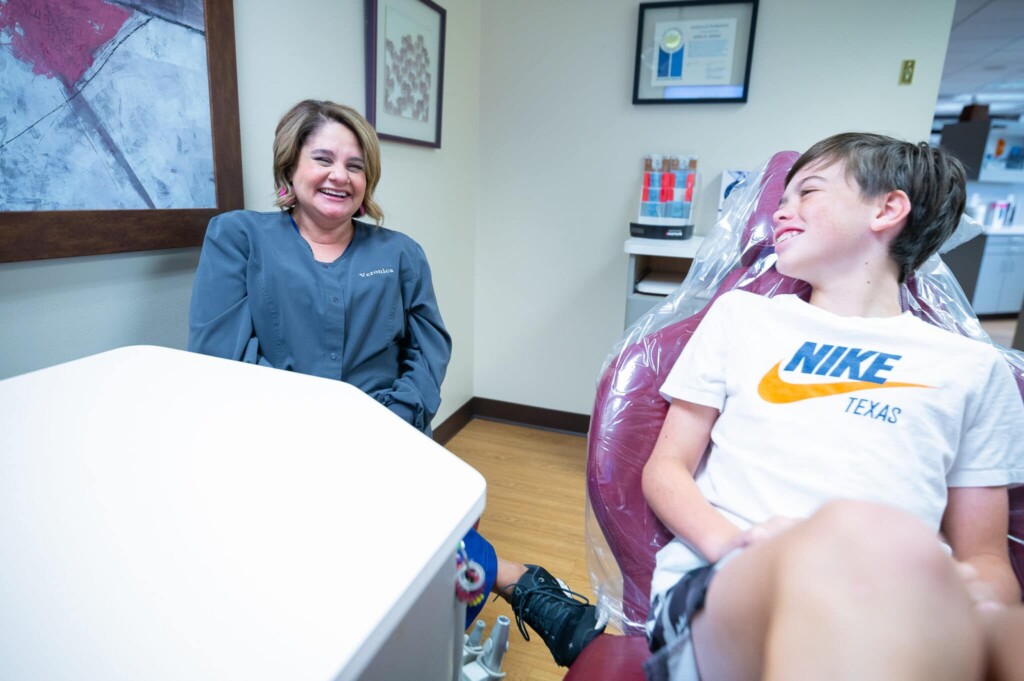Small children often get cavities. They don’t brush and floss as efficiently as adults, and their diet usually includes sugary snacks and drinks. So, how do you protect from early childhood tooth decay? Is there a way to prevent early childhood caries?
Woodhill Dental Specialties offers several solutions to help prevent tooth decay in kids, from fluoride treatments to oral hygiene education. We know how important your child’s oral health can be to their development, and we want them to have the best smile possible.
Early Childhood Caries (or ECC) is another way to say cavities and tooth decay in young children. It’s not uncommon for small children to get cavities in their baby teeth. Several factors could cause ECC, or cavities, in children.
Older children and adults brush their teeth at night, eliminating much of the bacteria and acids that form plaque and eat away at the enamel, the hard outer shell of the tooth. Small children who bottle-feed at night introduce extra bacteria and acids to their teeth overnight, which can increase tooth decay.
Poor oral hygiene habits can increase a child’s chances of tooth decay. Neglecting to brush or floss baby teeth can lead to cavities, and it doesn’t help the child learn good oral hygiene habits.
Even with good habits, children may not have the dexterity to brush their teeth properly. This means plaque could still build up on the teeth, even with regular brushing.
A small child’s diet can also contribute to ECC in children. Children moving from breast milk or formula to more solid food tend to eat foods and drink liquids high in carbohydrates and sugars. These break down in the mouth into the bacteria and acids that can cause cavities.

How do you know if your child has a cavity? Caries in children aren’t always easy to spot, especially on small baby teeth. Here is what to look for if you suspect your child has cavities:
The deciduous teeth, also known as milk teeth or primary teeth, are vital to your child as they develop both eating habits and speech. Certain sounds are created by placing the tongue against the teeth. If those teeth are damaged or missing, it could cause speech problems.
Your child also needs their teeth as they are learning to eat solid foods. Without the ability to chew properly, they could develop digestive problems such as acid reflux and nutritional deficiency.
The baby teeth serve another important purpose — as placeholders for the permanent teeth. As the baby teeth fall out, the permanent teeth emerge in the hole left by those teeth. If the baby teeth fall out too soon, the other teeth have time to move into the hole left before the permanent tooth can erupt, causing it to come in sideways or through the gums.
One way to help prevent cavities in small children is to start regular dental visits as soon as the first tooth erupts. You may think we can’t do much with one tooth, but that first visit gives us a chance to examine your child’s mouth to ensure their teeth are developing and will erupt correctly.
Regular dental visits after that will help your child get used to dental visits. It will also give us a chance to teach them and you how to clean baby teeth properly. The sooner we can start your child on proper oral hygiene techniques, the better the chances they will carry those good habits throughout their lifetime.
Once the baby teeth start to come in, we can protect them with a fluoride varnish. The fluoride varnish recommended age is 6-12 months, or as soon as the first tooth erupts. The fluoride varnish provides an extra layer of fluoride, which strengthens the enamel and helps prevent tooth decay.
Once the child’s molars are in, we can apply a dental sealant to those. Dental sealants are different from fluoride varnish in that they coat the tooth in a thin, plastic seal, preventing bacteria and acid from even reaching the tooth. It’s mainly used on the molars because it’s usually difficult for the child to clean the nooks and crannies of the molar surface easily.

You can help your child avoid cavities at home, too. A few simple steps can improve your child’s oral health and reduce their chances of dental caries and gum disease.
Yes! Baby teeth are vital to your child’s speech and digestive development. Cavities in baby teeth can also cause pain and lead to infection. It’s important to get the cavities fixed, even if the baby teeth will fall out eventually.
Tooth decay in the very early stages can be reversed, but you need to make changes right away, including brushing and flossing properly and visiting the dentist regularly.
Yes, fluoride varnish is safe to apply to your infant’s teeth. Though concentrated, it’s still a low amount of fluoride that is applied to your baby’s teeth. Still, it will protect their teeth from tooth decay.
In general, children should see the dentist twice a year for a professional cleaning and examination. However, those at high risk for cavities may need to see the dentist more often, such as every three months.
Cavities don’t just happen in older children. They can happen in younger children, as well. There are ways to protect your child’s teeth from early tooth decay, from learning good oral hygiene habits at home to receiving fluoride varnish at the dentist’s office.
If you suspect your child has cavities in Dallas, TX, schedule an appointment with Woodhill Dental Specialties in Dallas or Rockwall, TX. Let us take care of your child’s oral health!